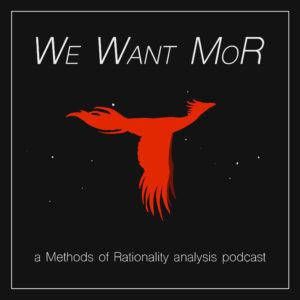
Harry attempts and fails to tap his Mysterious Dark Side for a magic boost while Hermione dominates the class effortlessly. Harry is then picked out by Professor Quirrell as the Most Dangerous Student in the Classroom.
Original chapters, written by Eliezer Yudkowsky, can be read here and the audiobook chapters, recorded by Eneasz Brodski, can be found earlier in this podcast feed and on the website.
In next week’s episode, we will be covering chapter 17.
Album art courtesy of Lorec from The Bayesian Conspiracy podcast’s Discord. Thank you!
Coy on the same Discord manages an RSS feed that compiles the relevant audiobook chapters with the WW MoR counterparts. Just copy and paste that link into your favorite podcast app in the “add by url” option. Thanks, Coy!
Sanderson’s 3 Laws of Hard Magic Systems
Podcast: Play in new window | Download | Embed
Subscribe: RSS



 RSS – All Posts
RSS – All Posts Stitcher Smart Radio
Stitcher Smart Radio Google Play
Google Play

For the record, it’s Frigideiro, not Frigiderio. The names aren’t quite THAT bad.
I only got to the 30 minute mark before I had to leave for work, but here are my thoughts so far.
There are some moments in the book which are a bit cringey. Not necessarily bad worldbuilding-wise, just not written in the most entertaining way. I find it a bit boring when something (in this case the transfiguration rules) gets repeated multiple times. Yeah, it’s an important thing, whatever. Forcing the audience to read it three times over is not the most interesting way to emphasize a point in a story.
That said, I think Brian and Eliezer (the author) have a very different perspective on the story, and that’s leading to some misunderstandings. Neither the transfiguration rules, nor the abilities of the Sorting Hat were included in the text for fear of nitpicking readers, I don’t think. They’re there because the story is meant to be solvable.
How to explain this? If the story was a new city to be explored, I think Brian would see himself as a tourist and the author as a taxi driver. He’s relying on the driver to know the way, so he doesn’t really need to know the map himself and therefore isn’t particularly interested in it. For him, the only reason why the driver would be explaining that route A is closed for construction work, so we’ll have to take route B, is because of nitpicky passengers who complain about the length/price of the trip. Since Brian isn’t that type of passenger, the explanation is bothersome and gets in the way of enjoying the view. He has a passive role in this interaction, just there for the ride. Most books expect (and as a result – teach) this kind of attitude from their readers, so it isn’t wrong!
On the other hand however, Eliezer seems to be thinking of himself as a dungeon master. Brian would then be a player, a member of Harry’s party. The DM cannot really keep the rules of the game to himself, he needs to describe the setting in detail, so the player(s) can interact with it. There are puzzles in the book, and there’s the expectation that the reader will be trying to solve them. Whenever Harry is faced with an obstacle, you can stop reading and try to think of how you would solve it yourself. Of course, that simply won’t work if it’s unclear what actions are available to you. Can you transfigure the obstacle into thin air? Can you resolve the problem by throwing money at it, which you transfigured from paper? There are many stories where such solutions would be possible, but the protagonist does something stupid or overcomplicated instead, because plot. MOR is meant to be a break from those. In exchange, it expects (or at least allows for) a more active role for the reader, which in turn necessitates that the reader learns a bit more about the rules of the magic system than usual.
So no, not all of the transfiguration rules are plot relevant. And at the same time, all of them are extremely plot relevant, in the sense that I’ve had to check them at least once when trying to come up with a solution for a problem that Harry was facing towards the end of the book. There are whole forums and comment threads with solutions, many of which use transfiguration and I can also think of at least one that involved the Sorting Hat (and an Unbreakable Vow). We had a lot of fun coming up with them, but that would have been impossible if we didn’t know the rules.
Another reason why we got the transfiguration rules is worldbuilding. Brian asked a few chapters ago whether it’s explained why the scientific method is unknown /unpopular in the wizarding world. Well, in addition to it being a new invention (a few centuries or so), while the wizards seem to be living in basically the middle ages (that one is on Rowling), they learn at an early age that guessing and experimentation are dangerous when it comes to magic.
This was an entire chapter of McGonagall explaining to the children that if they don’t know something, they shouldn’t try to find out on their own, or they’ll possibly die. Which is true – magic can have any arbitrary effect, just from waving a stick of wood. Even a small mistake can end up having big consequences, just because we’re dealing with something so powerful. Of course children are taught not to play with it. But that’s not a very good environment for the pursuit of scientific enquiries. As Dumbledore later says, there’s a reason why a lot of great discoveries are made by Gryffindors, not Ravenclaws.
So yeah, there are reasons why we get to hear all about the constraints and limitations of transfiguration, and it’s not only because the readers are nitpicky.
Sincerely,
a reader who has never nitpicked anything at all. Ever. And in particular never asked why Moody didn’t portkey some random textbook instead of the Triwizard Cup in book 4, or why the Trace doesn’t work consistently throughout the books, or why the Order of the Phoenix never gave Harry a way of contacting them in case of an emergency, or…
The Harry pointing out the weirdness of the minions thing came as a response to Draco getting annoyed at how his minions behaved in stereotypical ways that he didn’t tell them to. You know, the looming and weird accents stuff. Since they trained together since birth to be his minions without ever actually meeting their master to be, and since all of them are kids, Crabbe and Goyle already have trained into a routine, have got their inside jokes, have an ideo of how their job should look, and Draco has no clue about any of it, thus being an outsider to their behavior despite being their master. That’s what Harry pointed out and that’s why Draco tells him to shut up and stop talking about annoying truths.
Or at least that’s my interpretation.
I think the mental in Dune (1984) was Freddie Jones.
As far as explaining the Transfiguration rules: I read a Thomas Clancy novel, and he explained how nuclear bombs were assembled, at great length. As a nerd, I found it very interesting. It was not really necessary, but enjoyable to me. I did not consider the author’s motives, I just let the story go. *If* it ended up that the author was going into great detail later to cover his butt, then *when *that became apparent, I might be disappointed. But going through a book and reducing your enjoyment in the moment in anticipation of the author misusing a specific story element later seems like you are missing out. And given the high praise from many people, it is unlikely that the author is misusing the elements as is feared.